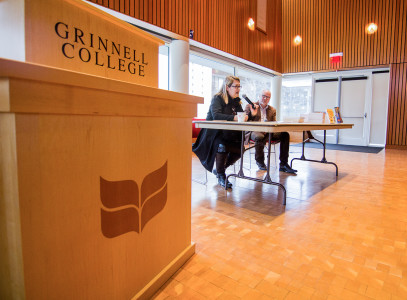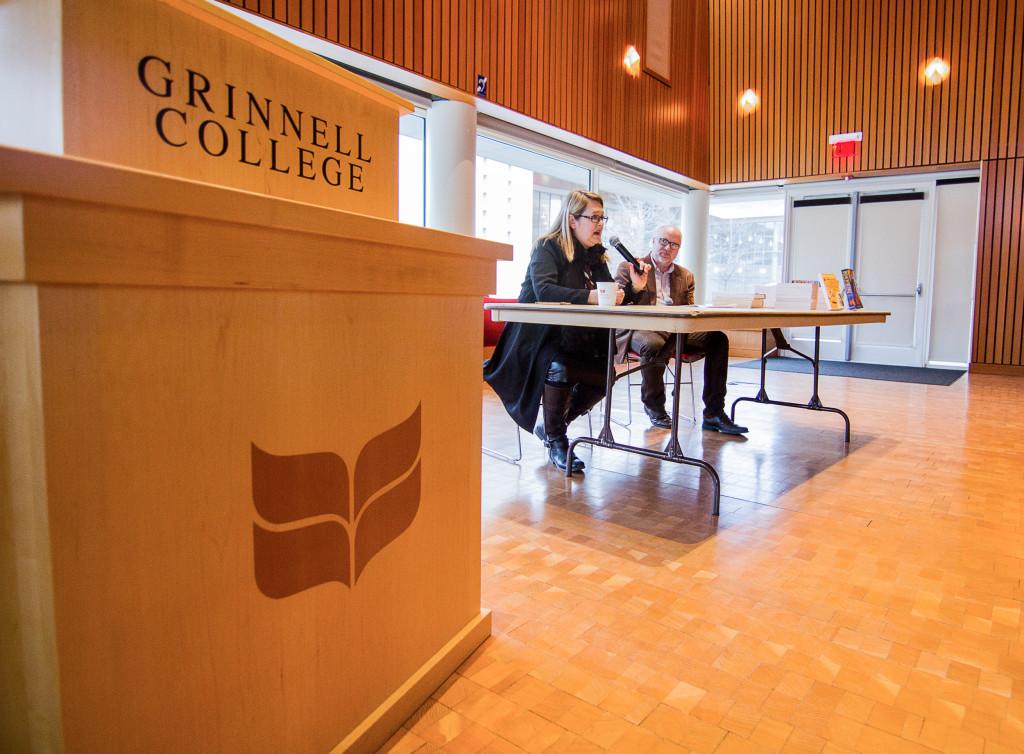Megan Tcheng
tchengme@grinnell.edu
Food writer and James Beard Foundation Award winner Anya Von Bremzen joined faculty members and students this past Thursday, March 3, to discuss her 2013 culinary memoir, entitled “Mastering the Art of Soviet Cooking: A Memoir of Food and Longing.” Von Bremzen’s personal narrative connects the experiences of three generations of her family with the changing social and political scene of their home in the Soviet Union.
Her visit, which was sponsored by the Russian Department; the Russian, Central and East European Studies Concentration and the John Crystal Fund for Distinguished Foreign Visitors demonstrates the pivotal role food plays in connecting culture and history.
“Everyone has a food experience. Food stories transcend difference. They bring us together,” explained Professor Todd Armstrong, Russian. “Food is one of the most intimate ways we can [connect] with each other. Anya Von Bremzen has written one of the most interesting food stories in my mind.”
In 327 pages, Von Bremzen tackles over a century of Russian history, starting with the Bolshevik Revolution in 1917 and ending with Vladimir Putin’s 21st century rise. By layering her personal experience with the historical context of a changing Soviet Union, Von Bremzen reimagines the possibilities of the food memoir.
“If you want a book to be successful, you really have to ask yourself, ‘Where is the narrative? What is going to turn pages?’” Von Bremzen said about her literary process. “Likewise, when you write a book that is genre-busting you always have to be aware where the narrative drive is coming from. For me and my book, that was from my family story.”
Throughout “Mastering the Art of Soviet Cooking,” Von Bremzen roots her experience in her relationship with food. She captures her connection with family and a changing country through her food memories, recalling the nostalgia of classic Russian dishes. In this way, Von Bremzen strives to emphasize the interconnected nature of food and culinary experience.

“Food is one of the great universals. Everyone eats. It is something that is so fundamental, more than anything else in life. How you eat and what you eat and who you share food with—it is all very much a part of personal experience,” she explained.
In her memoir, Von Bremzen specifically harkens back to the periods of shortage and absence that characterized Soviet life.
“For me, food evokes a whole gamut of emotion,” Von Bremzen said. “Sometimes the food was spoiled, sometimes it was terrible and sometimes it was great. There were triumphs about scoring something and frustrations about not having it. Constantly, we fantasized about the food we thought we’d never see.”
Von Bremzen recognizes the disparity between her current relationship with food as a successful food writer and her prior connection to food as a child growing up in the Soviet Union.
“It was very ironic that, coming from my background, I became a food writer. I’m probably the only food writer who never saw an avocado as a child,” Von Bremzen said. “And here I was going to all these fancy restaurants … and in the back of my mind, I always thought, ‘This is very surreal.’ I wanted to put those two sides of my experience together and write about it.”
Beyond her personal experience, Von Bremzen recognizes the importance of connecting her story to Russian history as a whole.
“[My memoir] is a way of domesticating and personalizing Soviet history. It looks at everyday life as a political concept, but also as something that existed. People lived it—they had their joys and their sorrows and their tragedies,” she said.
During her visit to Grinnell, Von Bremzen hopes to build on the universality of food experience and connect with students and faculty.
“By seeing and interacting with the person who wrote the book, you add a more human dimension to a subject like Russian history, that might have been more abstract or academic. My goal is to bring everyday life and academic studies together as much as I can, by example. And food really humanizes everything,” Von Bremzen said.



















































